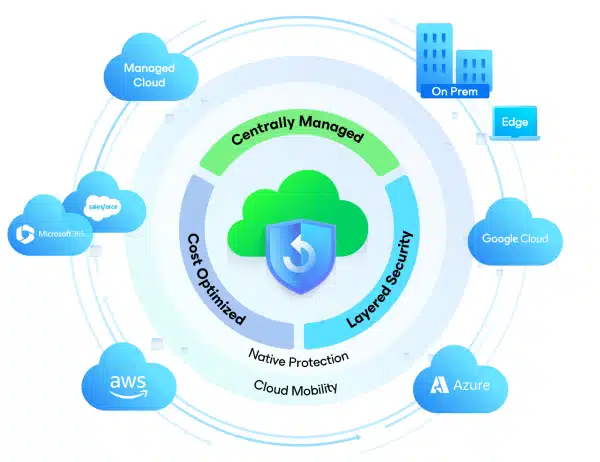When managing data center servers, particularly those running VMware, selecting the right IT backup software is crucial. In this comparison, I’ll examine six popular managed backup solutions: Veeam, Datto, Zerto, N-able, Bacula, and Druva. Managed backup is a form of paid monthly IT service that a MSP will provide in order to protect your data. I’ll also compare these solutions to Azure Backup and discuss the types of backup strategies — CDP, hourly, daily, and monthly. Additionally, I’ll delve into the security implications of using these tools in both public and private cloud environments.
Veeam
Strengths
- Comprehensive VMware Support: Veeam is highly optimized for VMware environments, providing seamless integration and robust features like instant VM recovery and automated testing of backups.
- Versatile Backup Options: Veeam supports various backup frequencies, from continuous data protection (CDP) to daily and monthly backups, making it highly adaptable to different business needs.
- User-Friendly Interface: The intuitive UI simplifies complex backup operations, enabling quick deployment and management.
Weaknesses
- Cost: Veeam’s advanced features come at a premium price, which may be prohibitive for small to mid-sized businesses.
- Complex Licensing: Navigating Veeam’s licensing can be complicated, potentially leading to higher costs if not managed carefully.
Datto
Strengths
- All-in-One Solution: Datto provides a comprehensive suite that includes backup, disaster recovery, and business continuity, all managed through a single platform.
- Ransomware Detection: With built-in ransomware protection, Datto can detect and alert on suspicious activity, ensuring quick action against potential threats.
- Hybrid Cloud Flexibility: Datto’s ability to back up data both locally and to the cloud offers flexibility and quick recovery options.
Weaknesses
- Limited Advanced Features for VMware: While Datto supports VMware, it lacks some of the advanced features offered by competitors like Veeam and Zerto.
- Vendor Lock-In: Datto’s proprietary systems can create dependency on their platform, limiting flexibility.
Zerto
Strengths
- Best for CDP: Zerto excels in Continuous Data Protection, offering near real-time replication, which is crucial for businesses needing minimal data loss in disaster recovery scenarios.
- Disaster Recovery Focus: Zerto’s robust disaster recovery (DR) features, including automated failover and failback, make it ideal for enterprises with stringent uptime requirements.
- VMware Integration: Zerto is particularly strong in VMware environments, providing seamless integration and advanced DR capabilities.
Weaknesses
- Complexity: Zerto’s advanced features require a steep learning curve, potentially increasing the time needed to achieve full operational efficiency.
- Higher Cost: Like Veeam, Zerto’s pricing can be high, especially for businesses that don’t need its extensive DR capabilities.
N-able
Strengths
- Cost-Effective: N-able offers a more affordable solution, making it attractive to small and mid-sized businesses.
- Ease of Use: The platform is known for its straightforward setup and user-friendly interface, simplifying backup management.
- Multi-Tenancy: N-able supports multi-tenancy, which is beneficial for Managed Service Providers (MSPs) managing multiple clients.
Weaknesses
- Limited VMware Features: N-able’s VMware support is not as comprehensive as other solutions, potentially limiting its effectiveness in complex VMware environments.
- Basic Feature Set: While it covers essential backup needs, N-able may lack the advanced features required by larger enterprises.
Bacula
Strengths
- Open-Source Flexibility: Bacula’s open-source nature allows for high customization, making it an excellent choice for organizations with specific needs and technical expertise.
- Cost-Effective: As an open-source solution, Bacula can be more cost-effective, particularly for businesses that have the technical resources to manage and customize it.
- Scalability: Bacula scales well, from small setups to large data centers, supporting a wide range of storage devices and backup types.
Weaknesses
- Complex Setup: Bacula’s flexibility comes with a trade-off — its setup and management require significant technical expertise.
- Limited Commercial Support: Being open-source, Bacula may lack the extensive support options provided by commercial software, which could be a drawback for organizations needing robust, around-the-clock support.
Druva
Strengths
- Cloud-Native: Druva is designed for the cloud, providing a scalable, flexible solution ideal for businesses already leveraging cloud environments.
- Global Deduplication: Druva’s global deduplication feature significantly reduces storage costs by ensuring that only unique data blocks are backed up.
- Strong Security Features: Druva offers strong encryption and compliance features, making it suitable for industries with strict regulatory requirements.
Weaknesses
- VMware Integration: While Druva supports VMware, it is not as deeply integrated or feature-rich in VMware environments as Veeam or Zerto.
- Dependence on Internet Connectivity: As a cloud-native solution, Druva’s performance is heavily dependent on internet connectivity, which could be a limitation in environments with unreliable connections.
Comparison with Azure Backup
Strengths of Azure Backup
- Integration with Azure Ecosystem: Azure Backup integrates seamlessly with other Azure services, making it an excellent choice for organizations heavily invested in the Azure cloud.
- Simplified Management: The platform provides a centralized backup management console, simplifying backup and recovery operations for Azure resources.
- Scalability: Azure Backup offers virtually unlimited scalability, accommodating the needs of businesses as they grow.
Weaknesses of Azure Backup
- Limited VMware Support: Azure Backup is not as well-suited for VMware environments compared to solutions like Veeam or Zerto. Its capabilities in this area are more basic.
- Performance Issues: Azure Backup can be slower in terms of backup and recovery times, particularly when dealing with large datasets.
- Cost Uncertainty: While Azure Backup is scalable, the cost can be unpredictable due to the pay-as-you-go pricing model, which can vary significantly based on data transfer and storage needs.
Types of Backup: CDP, Hourly, Daily, Monthly
Continuous Data Protection (CDP)
- Veeam and Zerto excel in CDP, with Zerto offering particularly advanced features for real-time replication. This is crucial for businesses that require minimal data loss and quick recovery times.
Hourly Backup
- Veeam and Datto are well-suited for hourly backups, providing a good balance between data protection and system performance. Hourly backups are ideal for environments where data changes frequently but do not require the near-instant recovery of CDP.
Daily Backup
- N-able and Bacula offer cost-effective daily backup solutions. These are sufficient for businesses where data changes are moderate, and a daily snapshot is enough to meet recovery objectives.
Monthly Backup
- Druva and Azure Backup are optimal for long-term, monthly backups, particularly for organizations that need to store large amounts of data over extended periods while ensuring compliance with data retention policies.
Security Comparison: Public vs. Private Cloud
Public Cloud Security
- Druva and Azure Backup stand out in public cloud environments, offering robust encryption and compliance features. Azure Backup benefits from Microsoft’s extensive security infrastructure, providing strong protection against threats.
- Datto also offers good public cloud security, with features like ransomware detection, although it lacks the deep cloud-native security integrations of Druva and Azure Backup.
Private Cloud Security
- Veeam and Zerto are better suited for private cloud environments, where businesses have more control over their infrastructure. They offer strong encryption and can integrate with existing security frameworks within the data center.
- Bacula provides flexibility in private clouds but requires more manual configuration to ensure security standards are met. It lacks the polished security features of commercial solutions.
Conclusion: Best Solutions for VMware
For VMware environments, Veeam and Zerto are the clear leaders due to their deep integration and advanced features tailored for VMware. Veeam is ideal for businesses needing a comprehensive, user-friendly solution, while Zerto excels in scenarios where continuous data protection and disaster recovery are critical. Datto can be a good alternative for businesses needing an all-in-one solution with strong business continuity features, though it lacks some of the advanced VMware-specific capabilities.
When comparing these solutions to Azure Backup, it’s clear that while Azure Backup is excellent for businesses deeply integrated into the Azure ecosystem, it falls short in VMware environments and lacks some of the advanced features offered by dedicated backup solutions like Veeam and Zerto. Additionally, Azure Backup’s security in the public cloud is robust, but its performance and cost predictability can be limitations.
Choosing the right backup solution requires careful consideration of your specific environment, including the type of cloud infrastructure you use, your backup frequency needs, and your budget. By understanding the strengths and weaknesses of each tool, you can make an informed decision that best suits your organization’s needs.


